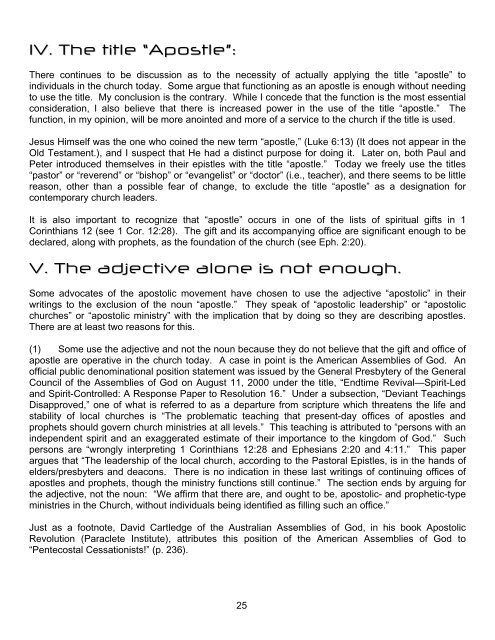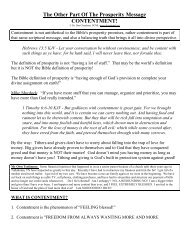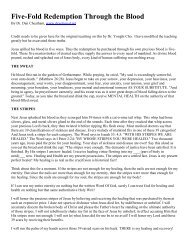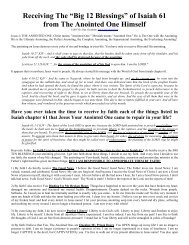Apostolic Alignment - FaithSite.com
Apostolic Alignment - FaithSite.com
Apostolic Alignment - FaithSite.com
Create successful ePaper yourself
Turn your PDF publications into a flip-book with our unique Google optimized e-Paper software.
IV. The title “Apostle”:<br />
There continues to be discussion as to the necessity of actually applying the title “apostle” to<br />
individuals in the church today. Some argue that functioning as an apostle is enough without needing<br />
to use the title. My conclusion is the contrary. While I concede that the function is the most essential<br />
consideration, I also believe that there is increased power in the use of the title “apostle.” The<br />
function, in my opinion, will be more anointed and more of a service to the church if the title is used.<br />
Jesus Himself was the one who coined the new term “apostle,” (Luke 6:13) (It does not appear in the<br />
Old Testament.), and I suspect that He had a distinct purpose for doing it. Later on, both Paul and<br />
Peter introduced themselves in their epistles with the title “apostle.” Today we freely use the titles<br />
“pastor” or “reverend” or “bishop” or “evangelist” or “doctor” (i.e., teacher), and there seems to be little<br />
reason, other than a possible fear of change, to exclude the title “apostle” as a designation for<br />
contemporary church leaders.<br />
It is also important to recognize that “apostle” occurs in one of the lists of spiritual gifts in 1<br />
Corinthians 12 (see 1 Cor. 12:28). The gift and its ac<strong>com</strong>panying office are significant enough to be<br />
declared, along with prophets, as the foundation of the church (see Eph. 2:20).<br />
V. The adjective alone is not enough.<br />
Some advocates of the apostolic movement have chosen to use the adjective “apostolic” in their<br />
writings to the exclusion of the noun “apostle.” They speak of “apostolic leadership” or “apostolic<br />
churches” or “apostolic ministry” with the implication that by doing so they are describing apostles.<br />
There are at least two reasons for this.<br />
(1) Some use the adjective and not the noun because they do not believe that the gift and office of<br />
apostle are operative in the church today. A case in point is the American Assemblies of God. An<br />
official public denominational position statement was issued by the General Presbytery of the General<br />
Council of the Assemblies of God on August 11, 2000 under the title, “Endtime Revival—Spirit-Led<br />
and Spirit-Controlled: A Response Paper to Resolution 16.” Under a subsection, “Deviant Teachings<br />
Disapproved,” one of what is referred to as a departure from scripture which threatens the life and<br />
stability of local churches is “The problematic teaching that present-day offices of apostles and<br />
prophets should govern church ministries at all levels.” This teaching is attributed to “persons with an<br />
independent spirit and an exaggerated estimate of their importance to the kingdom of God.” Such<br />
persons are “wrongly interpreting 1 Corinthians 12:28 and Ephesians 2:20 and 4:11.” This paper<br />
argues that “The leadership of the local church, according to the Pastoral Epistles, is in the hands of<br />
elders/presbyters and deacons. There is no indication in these last writings of continuing offices of<br />
apostles and prophets, though the ministry functions still continue.” The section ends by arguing for<br />
the adjective, not the noun: “We affirm that there are, and ought to be, apostolic- and prophetic-type<br />
ministries in the Church, without individuals being identified as filling such an office.”<br />
Just as a footnote, David Cartledge of the Australian Assemblies of God, in his book <strong>Apostolic</strong><br />
Revolution (Paraclete Institute), attributes this position of the American Assemblies of God to<br />
“Pentecostal Cessationists!” (p. 236).<br />
25






